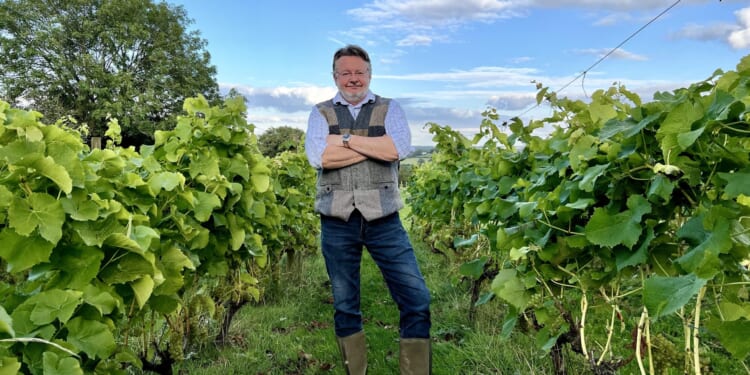Barry Lewis is the former Leader of Derbyshire County Council.
Farmers are living in a moment of contradiction: the cost of inputs — fertilisers, pesticides, energy — has never been higher, yet the returns from farming, especially on increasingly nature-depleted land, are ever more marginal. Meanwhile, the public purse is strained and the pressure applied by Labour on family farms is ever more burdensome, whilst increasingly the public asks: can we restore our natural inheritance without burdening taxpayers further?
The answer is: yes — and Conservatives should lead the way.
Kitty Thompson’s recent “Paradise Regained: The Conservative Case for Restoring English Nature” is a welcome clarion call (published via CEN and summarised recently at ConservativeHome). Her five tenets — national pride in landscape, steward empowerment, outcomes over outputs, market-based financing, and environmental sovereignty — resonate powerfully with a sensible, place-based approach.
But these are abstract principles for many; they must connect to soil, streams, woodlands and farms. That is where I come in — as the former Conservative leader of Derbyshire County Council (eight years) and as someone who has made the land my laboratory, I want to show how conservative nature policy can be made real — restoring nature, reducing costs, stimulating enterprise, and avoiding further burden to the taxpayer.
The Amber Valley Model
I’m a small-scale farmer. I run a vineyard and orchard and grow grapes and apples in the Amber Valley in Derbyshire. We produce wine and cider, and we’re expanding into agroforestry systems, a layered orchard to eventually provide multiple crops from spring wildflowers, to herbs, to grapes, apples, and pears from the same plot of land. As a regenerative grower, we don’t use any herbicides, fungicides, or pesticides. Instead, we encourage ecosystems within and around our vineyards and orchards, including nurturing healthy untilled soils rich in micro-organisms and mycorrhizal networks to provide those services naturally. The benefits for us:
Cut input costs: We do not spray synthetic pesticides or herbicides; instead, we foster beneficial insects, healthy soils, and plant diversity. Over time, this approach reduces reliance on costly chemicals. As someone who didn’t come from a farming background, I had little baggage – so I ploughed my own furrow – quickly eschewing artificial fertilisers, herbicides, and pesticides. Having mainly hybrid vines was beneficial in this regard as they are ideally and quickly suited to regenerative systems. The apple trees very quickly adapted. It wasn’t long before I figured out we didn’t need artificial inputs and that the relationship between farmer and the agricultural chemicals sector is, frankly, akin to that of the junkie and the pusher. With depleted and nearly inert soils, fractured and frayed ecosystems around them, crops and land have come to rely on artificial inputs, and the post-war burgeoning chemicals companies have met that need — and the costs to nature have been nothing short of devastating. Yet it doesn’t have to be this way.
Enhance ecosystem services: Pollinators, soil structure, water infiltration — these are not “extras,” they are central to resilient yields and less exposure to extreme weather. For example, a fruit orchard that has a late-mown and baled (after mid-July) wildflower meadow around it (and under it) can get the penetrative benefits of the ecosystem services deep into the orchard that can eliminate the need for pesticides and fungicides.
Offer experiential value: Through public events, guided walks, educational programmes, and community engagement, our land becomes both a living classroom and a source of cultural capital. For example, our orchard is every bit a ‘community orchard,’ welcoming well over a thousand visitors a year to markets, events, and tours, and is financially self-sustaining.
Tap alternative finance: We use crowdfunding, sponsorship, private donations, alongside enterprise revenue. None of this comes from the general taxpayer.
I have documented much of this in my Substack, where essays on soil health, regenerative viticulture, orchard systems, ecological monitoring, and community engagement form a practical evidence bank of “Conservatism in Action.” Via this narrative, our work stands as an everyday example of the ethos Thompson advocates for.
The usual ill-informed commentariat that leaps to the idea that to hold and espouse such views makes one a communist, a nutter, or a Green supporter and not a Conservative is far from correct. The clue is in the name – and the approach that CEN advocates in Paradise Regained is exactly what Conservatives should be fighting for.
Why this matters to Conservatives:
- Environmental Renewal Doesn’t Need Bigger Government. The conventional approach often assumes more regulation, more public spending, more burden. But conservatives should lead a different paradigm: one where regulation is lean but effective, where markets can catalyse, not crowd out, nature investment. The CEN emphasis on outcomes over outputs helps us resist box-ticking, pushing instead towards measurable ecological gains.
- Stimulating Rural Economies, Not Draining Them. Nature recovery done well is an economic engine. New enterprises, eco-tourism, stewardship jobs, woodland crafts, specialist farming — these can all flow from a revitalised landscape. Every falcon encouraged, every rare plant re-established, every stream made healthier and restored can become a point of attraction. More soil carbon, less flood damage, better water retention — these all reduce costs elsewhere in public budgets (flood relief, water treatment, infrastructure damage). The soil especially can become one of the best and easiest ways we can sequester carbon cheaply with far wider benefits to nature, economy and climate.
- Crowdfunding, Sponsorship & Private Investment — Not Just Public Funding. People want to invest in something meaningful. Our model shows that citizens, philanthropists, foundations and businesses can co-finance restoration projects. If the venture is credible, customers will support it, companies will sponsor it and communities will rally behind it, especially at the local level. That means we are not solely reliant on grants or the whims of Westminster.
- Reducing Risk in Public Finance. The approach I advocate doesn’t ask the government to ride shotgun as a full funder — but rather as an enabler. Public money can be used to de-risk early-stage projects, to build infrastructure (e.g. footpaths, fencing, water control), to guarantee minimum returns, to catalyse wider initiatives that provide capital seeding and wider public benefits, or to backstop compensation. But the ongoing revenue and scaling come from nature-based enterprise.
- A Conservative Narrative That Speaks to Heart and Soul. Thompson’s appeal to national pride, intergenerational duty, and the cultural soul of the English countryside is wise. We conservatives are custodians — not conquerors — of this land. Some rewilding, species recovery, biodiverse meadows, ancient hedgerows: these don’t just supply ecological benefits, they reintegrate us with the roots of our identity. If Conservatives lose the countryside, we lose a part of our story.
How we can meet challenges…
Standards and integrity in natural capital markets: Credits, offsets, ecosystem service payments must be rigorously tracked, independently audited, and additional (i.e. they should represent gains, not simply shifting credits). The leap from concept to credible market is nontrivial, but not insoluble if government acts as a standard-setter without becoming a bureaucratic behemoth.
Equity across regions: Not every landscape is a vineyard-slope or a scenic valley. Some places have poor soils, low attractiveness to tourists or sponsors, fewer local donors. We must guard against a “rich land patchwork” of recovery and an “abandoned periphery.” Public seed investment or matching funds can help bootstrap more marginal places.
Community buy-in and conflict avoidance: Species reintroductions (predators, beavers, wild grazers) will spark pushback. Transparent compensation, mediation, clear planning, and pilot schemes are essential. These will be challenging areas, so building local trust matters. Sometimes a place just isn’t right for this approach and needs to be recognised, but the potential benefits may need to be fully explored and tested. Solar farms, electric pylons and landscape conflict is another area where Conservatives have very different views to Ed Milliband and his ilk.
Pace vs patience: Nature doesn’t always move at political cycles. The temptation will be for programmes to demand quick wins for the media. But the commitment must be a multi-decade one. Conservative policymakers should embed continuity (between governments) into governance structures for long-horizon projects.
An invitation to fellow Conservatives
I’m pretty sure I’ll get a pile-on from some quarters for this article, but that’s okay. If we’re serious about supporting our farmers, our family farms, and ensuring they can feed the nation and be the custodians of all we hold dear about the countryside, we need a shift in thinking. No shift of this scale ever comes easily. We can’t continue to exist in this state of denial about nature, about how damaged our ecosystems and soils are – and farming is fundamental and central to putting it right. This is why Kitty Thompson’s publication needs to be read, understood, and supported as a central plank of British Conservatism and to influence policy.
When I wrote to Kitty Thompson and CEN recently, it was very much in collaboration and support for her work. Her framework gives us all a compass; my land gives the map – a demonstrator project, if you like.
We can make nature recovery part of the identity of modern Conservatism again: not as a green detour, but as a core part of what we offer — to communities, to the economy, to our shared heritage, to future generations. This shouldn’t be something that is owed by the Left, or the Greens (clearly now the far Left), or hijacked as ‘fallacy’ or ‘fake news’ by Reform, but owned squarely by Conservatives, where it started.
That is how we reclaim paradise. And that is why Conservatives must take it on, not as a pet cause, but as a defining mission.

















